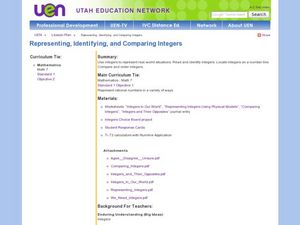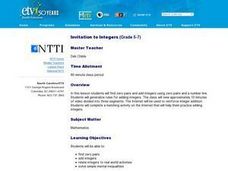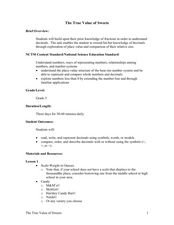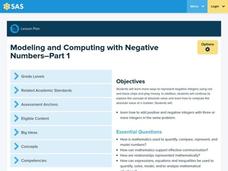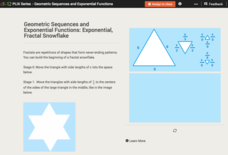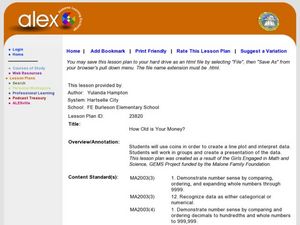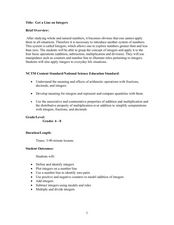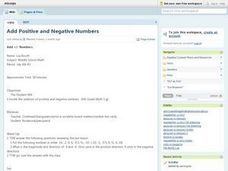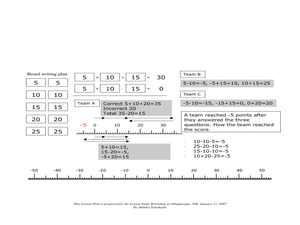EngageNY
Comparing Integers and Other Rational Numbers
The ninth installment of a 21-part module has pupils compare integers and rational numbers in decimal and fraction form. They match stories to number lines and compare values in the stories.
Utah Education Network (UEN)
Representing, Identifying, and Comparing Integers
This resource will knock your "sox" off! It comes with so many worksheets, projects, and other attachments that help you prepare your mathematicians to see positive and negative integers in the real world, including the White Sox stadium...
Curated OER
Use Models to Compare and Order Integers
Students investigate the concept of integers and how they should occur in the realm of irrational numbers. The lesson includes the use of positive and negative integers. The lesson is a good foundation in order to move into calculating...
EngageNY
The Multiplication of Polynomials
If you can multiply multi-digit integers, you can multiply polynomials. Learners use an area model to compare multiplying numbers to multiplying polynomials. They progress to using the distributive property.
Curated OER
Integers - Objects Model
Sixth and seventh graders solve 19 various types of problems related to integers as objects models. They write an integer that corresponds to each letter on a number line and then, arrange the integers from least to greatest. Pupils also...
Illustrative Mathematics
Comparing Temperatures
Which is colder -12 or -18? Temperature is natural real-world application of ordering rational numbers. It's also fun to talk about the lowest recorded temperature on Earth. Take the time to discuss this inquiry with your class.
Curated OER
Invitation To Integers
Students find zero pairs and add integers using zero pairs and a number line. They generalize rules for adding integers. The class view approximately 10 minutes of video divided into three segments.
Curated OER
Invitation to Integers
Students find zero pairs and add integers using zero pairs and a number line. They generalize rules for adding integers. Students complete a matching activity on the Internet that helps them practice adding integers.
Center for Mathematics and Technology
Whole Numbers: Using an Area Model to Explain Multiplication
There are many ways to work through a multiplication problem. Using an area model, kids complete several worksheets with different types of multiplication problems, including multiplying by ten, and explain how the new strategies differ...
Curated OER
"Zero-ing" In On Integers
Students add and subtract integers. In this integer lesson, students use models to demonstrte the addition and subtraction of integers. They describe zero pairs and write steps to add and subtract integers.
Curated OER
The True Value of Sweets
Measure your pupil's learning in a lesson designed to explore decimals by weighing different candies on a scale and recording the weight. Small groups then compare and order the decimal weights on a number line to show their...
Alabama Learning Exchange
The World of Integers
Review operations related to rational numbers and integers using the include PowerPoint presentation, "Interesting Integers." Young mathematicians classify rational numbers as being natural, whole, or integers and read an article about...
Waterloo Mathematics
Number Sense and Numeration: Integers - Objects Model
Here is a comprehensive task for your middle school mathematicians regarding the multiplication and division of integers. Word problems and practical problems abound, while occasional graphics make the page more visually appealing. A...
Curated OER
Ordering Integers
Sixth and seventh graders compare and order integers. After locating integers in a newspaper, they describe examples of negative and positive integers. They draw a thermometer and locate positive and negative integers on the scale. In...
Curated OER
Positive and Negative Numbers
Pupils use blocks and markers to illustrate the processes of adding, subtracting, multiplying and dividing integers. In this mathematics lesson, learners use Algebra blocks to demonstrate multiplying polynomials.
Curated OER
Order Numbers On a Number Line
Fifth and sixth graders study the use of a number line to add integers and they observe a teacher demonstration of how to add integers on a number line. Afterward, they construct a number line and use the number line to solve addition...
Curated OER
Dividing with Fractions
Use paper strips or models to relate division problems to division of fraction problems. Since the materials can be broken up, it helps them to show how they can complete repeated subtraction with fractions and not just whole numbers.
CK-12 Foundation
Exponential Growth: Exponential, Fractal Snowflakes
Examine an exponential growth model. Using a fractal, learners calculate the perimeters of each stage. When comparing the consecutive perimeters, a pattern emerges. They use the pattern to build an equation and make conclusions.
Pennsylvania Department of Education
Fractional Parts Using an Area Model
Learners explore multiplying fractions and their relationship to parts of a whole. They draw and shade fractional parts to show parts of a whole and fractional parts of a fraction. Pupils also use an Internet site for interactive practice.
Alabama Learning Exchange
How Old is Your Money?
Elementary learners explore coin mint dates. First, they listen to the book Alexander Who Used to be Rich Last Sunday by Judith Viorst. They then sort a collection of coins according to their mint date and put them in order from oldest...
Curated OER
Get a Line on Integers
Students explore number sense by completing math function problems in class. In this integers lesson, students define integers and practice plotting them on a number line. Students utilize math functions such as addition and...
Curated OER
Add Positive And Negative Numbers
Scholars investigate the concept of adding positive and negative numbers. They practice adding using the number line for scaffolding. This can be done as a game for younger learners, but may also be helpful for engaging the older pupils.
Curated OER
Playing Math Fever
Pupils complete activities to learn notation and uses for positive and negative numbers. For this number system lesson, learners play a game similar to Jeopardy to learn how to solve problems with positive and negative numbers.
Curated OER
The Real Number System
Learners analyze the real number system. They discuss real numbers, rational and irrational numbers, integers, whole numbers, natural numbers and more of the real number in the system. They differentiate between all these numbers.



